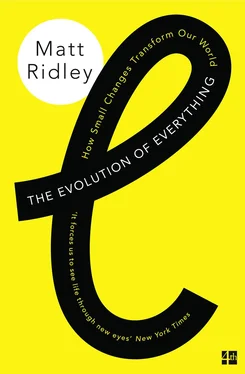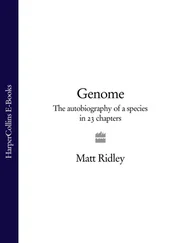It was trivial work for evolution’s champions, such as Kenneth Miller, to dismantle these cases in the Dover trial to the satisfaction of the judge. A fully functional precursor of the bacterial flagellum with a different job, known as the Type III secretory system, exists in some organisms and could easily have been adapted to make a rotary motor while still partly retaining its original advantageous role. (In the same way, the middle-ear bones of mammals, now used for hearing, are direct descendants of bones that were once part of the jaw of early fish.) The blood-clotting cascade is missing one step in whales and dolphins, or three steps in puffer fish, and still works fine. And the immune system’s mysterious complexity is yielding bit by bit to naturalistic explanations; what’s left no more implicates an intelligent designer, or a time-travelling genetic engineer, than it does natural selection. At the trial Professor Behe was presented with fifty-eight peer-reviewed papers and nine books about the evolution of the immune system.
As for the purposeful arrangement of parts, Judge Jones did not mince his words: ‘This inference to design based upon the appearance of a “purposeful arrangement of parts” is a completely subjective proposition, determined in the eye of each beholder and his/her viewpoint concerning the complexity of a system.’ Which is really the last word on Newton, Paley, Behe, and for that matter Aquinas.
More than 2,000 years ago Epicureans like Lucretius seem to have cottoned on to the power of natural selection, an idea that they probably got from the flamboyant Sicilian philosopher Empedocles (whose verse style was also a model for Lucretius), born in around 490 BC. Empedocles talked of animals that survived ‘being organised spontaneously in a fitting way; whereas those which grew otherwise perished and continue to perish’. It was, had Empedocles only known it, probably the best idea he ever had, though he never seems to have followed it through. Darwin was rediscovering an idea.
Why was it even necessary, nearly 150 years after Darwin set out his theory, for Judge Jones to make the case again? This remarkable persistence of resistance to the idea of evolution, packaged and repackaged as natural theology, then creation science, then intelligent design, has never been satisfactorily explained. Biblical literalism cannot fully justify why people so dislike the idea of spontaneous biological complexity. After all, Muslims have no truck with the idea that the earth is 6,000 years old, yet they too find the argument from design persuasive. Probably fewer than 20 per cent of people in most Muslim-dominated countries accept Darwinian evolution to be true. Adnan Oktar, for example, a polemical Turkish creationist who also uses the name Harun Yahya, employs the argument from design to ‘prove’ that Allah created living things. Defining design as ‘a harmonious assembling of various parts into an orderly form towards a common goal’, he then argues that birds show evidence of design, their hollowed bones, strong muscles and feathers making it ‘obvious that the bird is product of a certain design’. Such a fit between form and function, however, is very much part of the Darwinian argument too.
Secular people, too, often jib at accepting the idea that complex organs and bodies can emerge without a plan. In the late 1970s a debate within Darwinism, between a predominantly American school led by the fossil expert Stephen Jay Gould and a predominantly British one led by the behaviour expert Richard Dawkins, about the pervasiveness of adaptation, led to some bitter and high-profile exchanges. Dawkins thought that almost every feature of a modern organism had probably been subject to selection for a function, whereas Gould thought that lots of change happened for accidental reasons. By the end, Gould seemed to have persuaded many lay people that Darwinism had gone too far; that it was claiming a fit between form and function too often and too glibly; that the idea of the organism adapting to its environment through natural selection had been refuted or at least diminished. In the media, this fed what John Maynard Smith called ‘a strong wish to believe that the Darwinian theory is false’, and culminated in an editorial in the Guardian announcing the death of Darwinism.
Within evolutionary biology, however, Gould lost the argument. Asking what an organ had evolved to do continued to be the main means by which biologists interpreted anatomy, biochemistry and behaviour. Dinosaurs may have been large ‘to’ achieve stable temperatures and escape predation, while nightingales may sing ‘to’ attract females.
This is not the place to retell the story of that debate, which had many twists and turns, from the spandrels of the Cathedral of San Marco in Venice to the partial resemblance of a caterpillar to a bird’s turd. My purpose here is different – to discern the motivation of Gould’s attack on adaptationism and its extraordinary popularity outside science. It was Gould’s Lucretian swerve. Daniel Dennett, Darwin’s foremost philosopher, thought Gould was ‘following in a long tradition of eminent thinkers who have been seeking skyhooks – and coming up with cranes’, and saw his antipathy to ‘Darwin’s dangerous idea as fundamentally a desire to protect or restore the Mind-first, top–down vision of John Locke’.
Whether this interpretation is fair or not, the problem Darwin and his followers have is that the world is replete with examples of deliberate design, from watches to governments. Some of them even involve design: the many different breeds of pigeons that Darwin so admired, from tumblers to fantails, were all produced by ‘mind-first’ selective breeding, just like natural selection but at least semi-deliberate and intentional. Darwin’s reliance on pigeon breeding to tell the tale of natural selection was fraught with danger – for his analogy was indeed a form of intelligent design.
Again and again, Darwin’s followers would go only so far, before swerving. Alfred Russel Wallace, for instance, co-discovered natural selection and was in many ways an even more radical enthusiast for Darwinism (a word he coined) than Darwin himself. Wallace was not afraid to include human beings within natural selection very early on; and he was almost alone in defending natural selection as the main mechanism of evolution in the 1880s, when it was sharply out of fashion. But then he executed a Lucretian swerve. Saying that ‘the Brain of the Savage [had been] shown to be Larger than he Needs it to be’ for survival, he concluded that ‘a superior intelligence has guided the development of man in a definite direction, and for a special purpose’. To which Darwin replied, chidingly, in a letter: ‘I hope you have not murdered too completely your own and my child.’
Later, in a book published in 1889 that resolutely champions Darwinism (the title of the book), Wallace ends by executing a sudden U-turn, just like Hume and so many others. Having demolished skyhook after skyhook, he suddenly erects three at the close. The origin of life, he declares, is impossible to explain without a mysterious force. It is ‘altogether preposterous’ to argue that consciousness in animals could be an emergent consequence of complexity. And mankind’s ‘most characteristic and noble faculties could not possibly have been developed by means of the same laws which have determined the progressive development of the organic world in general’. Wallace, who was by now a fervent spiritualist, demanded three skyhooks to explain life, consciousness and human mental achievements. These three stages of progress pointed, he said, to an unseen universe, ‘a world of spirit, to which the world of matter is altogether subordinate’.
Читать дальше












